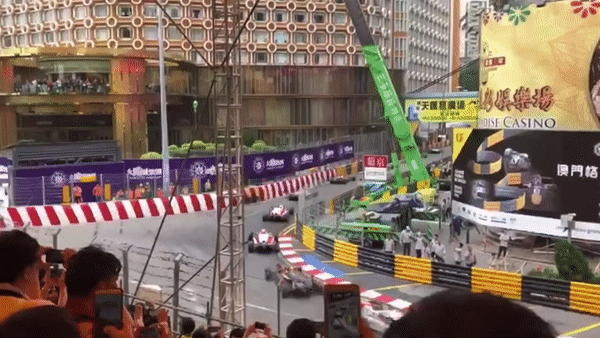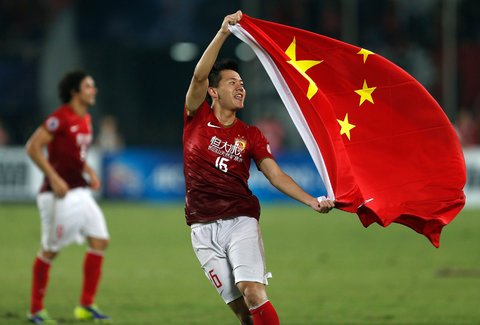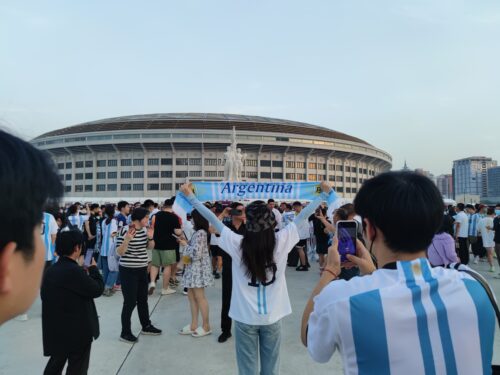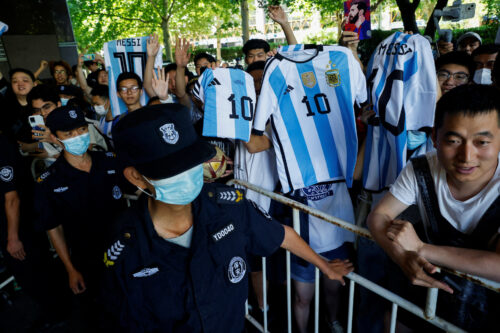Sophia Floersch fractures spine in scary F3 Macau crash that could’ve been worse

The China Sports Column is a The China Project weekly feature in which China Sports Insider Mark Dreyer looks at the week that was in the China sports world.
Now in its 65th year, the Macau Grand Prix is one of the highlights on motorsport’s annual calendar. While it’s never been on the Formula 1 circuit, you’d be hard pressed to find a major F1 star who hasn’t raced in Macau at some point in their career. Ayrton Senna, Michael Schumacher, David Coulthard, Mika Hakkinen, and Lewis Hamilton are among the many F1 legends who have battled there over the years, with winners of the headline F3 race in Macau often going on to F1 greatness.
It’s perhaps no surprise that a race in the gambling mecca of Macau is known for its entertainment, but what sets the famed Guia street circuit apart from other tracks around the world is its combination of high-speed corners, twists and turns, and elevation.
That cocktail leads to some of the most dramatic moments in motorsport, and last weekend was no exception, as footage of 17-year-old German Sophia Floersch flying through the air into one of the barriers at 276 kilometers per hour (171.5 mph) went viral, with the story ending up on the front page of mainstream websites.
With broadcast pictures from multiple camera angles and dozens of people in the crowd uploading alternative versions to social media, it was hard to miss the incident that was both mesmerizing and unbelievable in its result: Floersch’s injuries weren’t life-threatening, and it doesn’t look like she’ll suffer paralysis. Five others were injured.
While the circuit has witnessed a handful of fatalities over the years, it’s also invested heavily in security, with the photographers’ bunker into which Floersch flew effectively both cushioning her impact and protecting the photographers within. Floersch was conscious throughout, posted on social media later that evening, and eventually successfully underwent seven-hour surgery to repair a fractured spine.
Just wanted to let everybody know that I am fine but will be going into Surgery tomorow morning. Thanks to the @fia and @hwaag_official @MercedesAMGF1 who are taking great care of me.
Thanks to everybody for the Supporting messages.
Update soon.— Sophia Floersch (@SophiaFloersch) November 18, 2018
Of course, in the chain of events that began with the German hitting the back of Jehan Daruvala’s car and ended with many of those watching fearing the worse, things could certainly have turned out very differently. But there’s a danger in overplaying any incident based on horrifying TV images.
If measures are taken to ensure total safety at all costs, then the very essence of the sport is neutered. No one gets into racing, whether on two wheels or four, without a keen awareness that danger lurks around every corner. But that danger, and that thrill, is precisely why they race.
Formula 1 drivers were in open dissent a few seasons ago when much of their job involved simply managing their tire degradation and optimizing their fuel loads. If race cars become little more than remote-controlled vehicles with drivers just along for the ride, both drivers and fans will become disillusioned.
I’ve commentated on various races at Macau over the past few years, with several of them producing dramatic moments. Former F1 driver Alex Yoong’s spin on the exit of the lightning-quick Mandarin Bend in 2013 and Laurens Vanthoor winning the 2016 FIA GT World Cup despite ending the race upside down at a similar point on the track were two of the most memorable.
Speaking to the drivers themselves, it’s clear they have a different perspective than the average sports fan. Hong Kong’s Adderly Fong told me in 2013: “When you step into a racing car everyone should be prepared for the worst, but you have to put it in the back of your mind, because death is the only thing that causes fear and when you have fear, you can’t drive fast.”
“It’s a gamble each time, like walking into a casino,” he added.
But if that sounds frightening, Fong, like many others, keeps coming back for more, and has taken part in races at Macau several times since then, including this year. And that’s the point. No one forces drivers to get into a race car, and they all willingly partake, keenly aware of the risks involved.
German driver Maro Engel, who has finished on the podium in Macau in each of the past five years, summed up the prevailing feeling among the drivers. “The danger absolutely makes it more exciting. That’s why we’re here,” he said. “It’s the greatest track in the world.”
While it’s fortunate that there were no fatalities in Macau, I think it’s time to declare the death of Chinese football.
In a period that’s seen head-scratching decisions on everything from banned tattoos, youth development, transfer fees, player suspensions, and — most recently — an effective ban on casual fans watching Shanghai SIPG claim the title, the latest moves to introduce a salary cap for the Chinese Super League (CSL) should successfully kill off any remaining interest in the league.
The current crop of Chinese players has, with few exceptions, proved to be incapable of World Cup qualification, even if FIFA expands the 2022 competition to 48 places from the current 32.
And with the introduction of further youth player quotas and military-style training camps, those in charge have proved again they have absolutely no idea how to chart a successful course, instead deciding that those evil foreigners populating the league must be to blame.
How else to interpret the impending salary cap, which will drive any half-decent foreigner from the league? While salary caps can work well — and are fairly standard in North American sports — the CSL’s limit is almost certain to be far too low in a politically-motivated bid to control spending. As a result, the big international names will swiftly leave, thereby lessening the overall standard and making the CSL an even less attractive proposition for long-suffering fans.
The silver lining is that the best domestic players, who have become ludicrously overvalued in recent years due to the CSL’s ill-judged quotas, will now be paid something more in line with their worth and may even push some of them to test themselves overseas.
But the descent of the league into oblivion since China announced plans to reform the sport in 2015 has been all too swift.
RIP Chinese football.
The China Sports Column runs every Friday on The China Project. Follow Mark Dreyer @DreyerChina.







